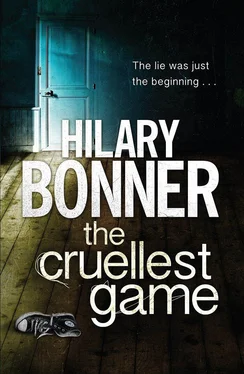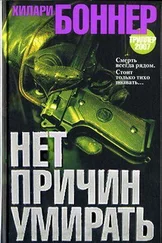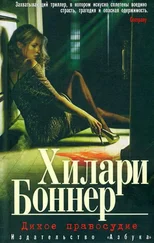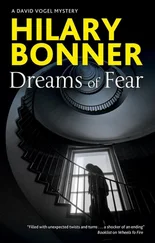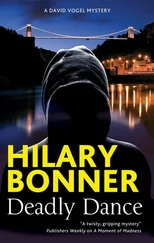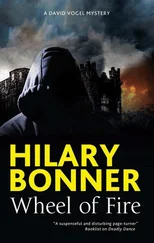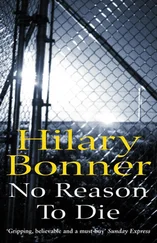‘Hi,’ I said. ‘I’m Marion Anderson, Conor’s English teacher.’
The man smiled a greeting. ‘Michael Shaw, his dad,’ he responded easily.
‘I’m also Robbie Anderson’s mum,’ I said.
The smile faded at once.
‘Pleased to meet you,’ said Michael Shaw, sounding and looking anything but. ‘Unfortunately I’m in a hurry. Must go, I’m afraid.’
With that he started the engine of the Range Rover, slammed his foot on the accelerator, and took off at a considerably greater speed than was ever encouraged outside Okehampton College.
I’d only been able to see Michael Shaw through his car window. He had a broad, quite highly coloured face and looked as if he would be a big man when stood up. I remember what Sue Shaw had said on the day of the funeral. ‘Dad will kill me.’
I wondered, watching the dust settle after his sudden departure in the big four-wheel-drive, if the man had a temper. And if so, just how bad it was.
I thought I would like to at least try to talk to both Michael Shaw and his daughter again one day soon. But not yet.
I still did not believe my son had killed himself, and I still wanted to find out the whole truth about his death. I also doubted that I yet knew the whole truth about the husband who had deceived me for so long.
But I’d put all of that almost deliberately on hold by returning to teaching. I felt that I needed to heal myself before I could proceed further with anything else. And my wounds were deep.
However, by the end of the working week, and of my fourth day back at Okehampton College, I felt pleasantly weary and certainly more in control than I had since Robbie’s death. I’d stayed on in Okehampton for a Friday pub lunch with a couple of the other teachers, and almost enjoyed myself. On the way home I called Bella to see if she would like to set a time for that dog walk she had suggested over the coming weekend. There was no reply so I surprised myself somewhat by leaving a message which, while far from cheery, was at least fairly bright and positive.
But this very slightly better frame of mind was not to last for long. I arrived at Highrise to find Florrie running loose in the yard and the front door standing wide open.
Hesitantly, I approached the old house. My heart felt like Big Ben booming away within my chest. I was full of foreboding, but I just had to step inside.
The grandfather clock Robert had always been so proud of lay on its side on the flagstoned floor in the hall. Its lovely glass face had been smashed and its mechanism, its core, ripped from its casing.
The sitting-room door was open and I could see that the chairs and settees had been turned on their sides and the TV screen smashed. There was also a horrible smell in the house. It was all too familiar. The same smell which had greeted me when I’d found Robbie’s body. The sour stench of human excrement.
I took a step back outside again. I could not enter any further. Not alone. I was afraid of what other terrible damage I might discover. But more than that, I was afraid of who might still be there.
I called the police at once on my mobile. I’d told myself I’d never trouble the Devon and Cornwall Constabulary again. This was different. I had no choice. And in any case, this time they could hardly conclude that I’d imagined what had happened, surely.
I loaded Florrie into the back of the car to keep her out of the way, and then sat in the vehicle myself, waiting, in a kind of trance, until a police patrol car arrived. The two uniformed officers who stepped out of it were regrettably familiar. They were the same young men who had been sent round when I’d reported my night-time intruder the previous Sunday.
Apparently I was on their beat.
It was the same routine too. PC Bickerton waited with me outside Highrise while PC Jacobs checked the place out. This time, though, it was several minutes before he returned, and when he did he looked shocked.
‘Mrs Anderson, you may not want to go back into your house today,’ he began. ‘It’s a bit of a mess. Is there anyone you can stay with? Anywhere we can take you?’
I shook my head vehemently. ‘No,’ I said. ‘This is my home, I want to see what’s happened to it.’
He hesitated just for a second. ‘Of course,’ he said. ‘But you’d better prepare yourself. It’s not very nice, not very nice at all.’
We walked up the steps to the front door together. PC Bickerton checked the lock and the bolt, just as he had before.
‘Nothing wrong here,’ he said. ‘No sign of forced entry at all at the front. What about the windows and the back door? Did you notice any signs of tampering when you were inside, Jim?’
Jacobs shook his head.
Bickerton leaned forward, studying the lock on the front door more closely.
‘Doesn’t look like you’ve had this changed, Mrs Anderson,’ he remarked. ‘Nor the other two, at the back and on the garden gate, I suppose?’
I agreed that I hadn’t had any of the three locks replaced. I saw the two officers exchange glances.
‘Bit surprised you didn’t do so after the other night,’ Bickerton continued quite casually.
I supposed that was surprising. And I couldn’t explain it really. Except that after I’d ascertained that Robert really was in the North Sea and made the decision to start teaching again I’d just tried to put everything else out of my mind. Maybe even to make myself believe I had imagined that intruder. Crazily, perhaps, I hadn’t even seriously considered any kind of repetition.
I pushed past PC Bickerton into the hall. Again, the first thing I saw was the poor broken clock.
I paused and turned to face the policemen.
‘You’re sure there... there’s nobody i-in there, are you?’ I asked falteringly.
PC Jacobs gave a little tight-lipped smile he presumably thought was reassuring. ‘Of course I’m sure,’ he said.
Highrise was a wreck. Every room had been rubbished. The sitting room, in spite of the human excrement which had been smeared over the soft furnishings, the carpet, and the walls, was not the worst. Robbie’s room, at the top of the house, was the most affected. All his beautiful oak furniture had been attacked with an axe. The desk he and his father had been so proud of was little more than firewood.
In the kitchen, just about every piece of crockery I possessed had been smashed. And all my glasses. The best stuff, displayed on a Welsh dresser, had been swept onto the flagstoned floor, and every shelf and cupboard seemed to have been emptied. There were no longer any bottles in the kitchen wine rack. They had been smashed too, their contents forming predominantly red puddles. The room smelt of alcohol, and we had to pick our way carefully through fragments of china and glass.
The fridge-freezer that I so loved, one of those big American ones, had been disconnected and its doors left open. Ice cream was already dripping onto the floor. The table and all the chairs had been overturned. Predictably, the screen of the TV, even though it was fixed high on one wall so that it could be seen from every part of the room, had been shattered.
There was so much damage I couldn’t take it all in properly. Everything that had been free-standing, including almost all of my kitchen utensils and electric items like the toaster, appeared to have been swept violently to the floor. Only the microwave and the espresso machine, which were built into the units, seemed to have survived. I also registered that the Aga was still burning. There wasn’t much you could do to an Aga, however vicious you were. And suddenly I realized how cold I was. I supposed it had been cold waiting in the stationary car in the yard, although I hadn’t really noticed. It could also have been shock again. The leather armchair had been knocked onto its side. I hauled it upright, moved it as close as possible to the big iron stove, and sat down.
Читать дальше
